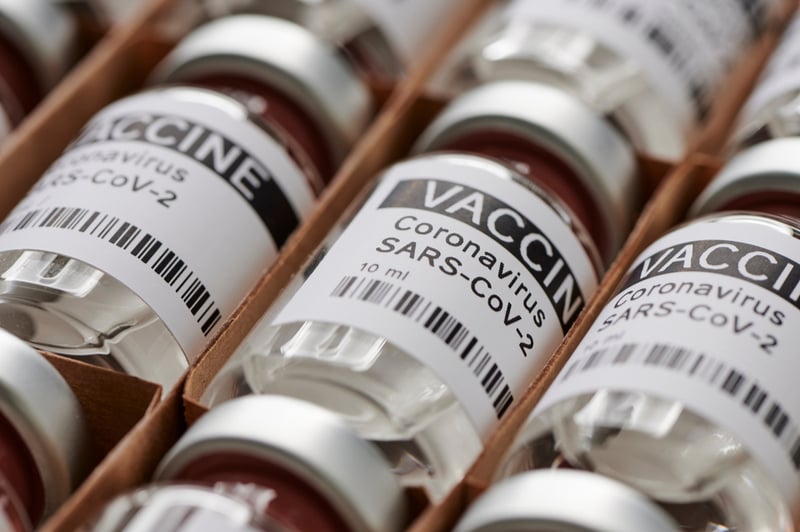Newsletter Signup - Under Article / In Page
"*" indicates required fields
Companies developing vaccines, drugs, and diagnostics for Covid-19 are being forced to scale up manufacturing at high speed in order to meet the enormous demand.
There has been an unprecedented amount of research carried out over the last year to develop vaccines, drugs, and diagnostic tests to combat the Covid-19 pandemic.
Before Canada gave the green light today, the UK was the first country to approve a cutting-edge vaccine made from messenger RNA (mRNA) developed by BioNTech and Pfizer. Vaccinations are already being rolled out across the country, a logistical achievement given the vaccine requires specialist handling and storage at -70 degrees centigrade.
Traditional vaccine manufacture is a long process that typically requires complex stages of incubation in specialized facilities.
Pfizer and BioNTech’s vaccine is based on mRNA technology, which is easier, faster, and cheaper to manufacture than traditional vaccines. However, despite Pfizer’s vast money and resources, the big pharma has struggled to meet the supply targets it initially set for the vaccine, having to downsize its initial 100 million doses in 2020 estimate down to 50 million last month.
The difficulties of manufacturing aren’t limited to Covid-19 vaccines either. Last month, for example, the FDA approved the use of antibody drugs to treat Covid-19, and these are complex to produce. Diagnostics and cell therapies in development are other examples.
“Clearly all supply lines have been strained, from raw material to capacity of available manufacturing,” said Patrick Amstutz, CEO of Molecular Partners, a Zürich-based biotech producing protein drugs called DARPins that started a Covid-19 program in April.
“We are now seeing in real time how fast science can move to discover new therapies and vaccines, yet the logistical deployment and production of these treatments are still lacking. This speaks to the fact that this is a global pandemic and everything is stretched to meet this need.”
The Native Antigen Company, a UK-based supplier of antigens and antibodies, was one of the first companies to release antigens of the virus responsible for Covid-19, SARS-CoV-2, for the development of Covid-19 diagnostics and vaccines.
“Seeing a huge surge in demand for coronavirus antigens, we’ve had to rapidly scale our capacity and form third party partnerships for stable cell line production,” said Andy Lane, Commercial Director at the Native Antigen Company, which was recently acquired by the LGC group. “Achieving all of this during a pandemic has been challenging to say the least.”
Touchlight DNA services, the contract manufacturing arm of UK biotech Touchlight Genetics, aims to support Covid-19 drug and vaccine manufacture by producing and supplying synthetic DNA and other components of advanced therapies.
The company’s CEO, Karen Fallen, told me that quick and effective planning has been key to getting supply chains up and running. However, she emphasizes that expansions and investment are needed to fulfill such a high demand in the longer term.
“With the growing number of approved and soon-to-be-approved nucleic acid vaccines, such supply chain issues will come much more into the forefront. For the delivery of the expected millions of vaccine doses, fast manufacture and rapid scale-up will be essential.”

Fortunately, funding has been pouring into the sector.
“We can see governments playing a significantly bigger role than they normally would – for instance through BARDA, DARPA, or CEPI,” said Fallen.
“Private financing is also considerable, while the sizeable investments by Pfizer or AstraZeneca show the willingness of big pharma to drive new technologies forward, using commercial financing.”
A key decision that has to be made when producing a vaccine or therapeutic, is whether to manufacture it in house or whether to use the expertise of a CDMO partner.
“There are certainly pros and cons to both. In-house manufacturing can be more cost-effective at scale, and can decrease supply chain risks. However, outsourcing can provide rapid access to relevant resources and skills, while freeing up in-house capacity for other projects,” said Lane.
“What is essential is a secure supply chain that ensures robustness and the security of supply,” emphasized Fallen. “A dual source could be ideal, especially in a pandemic situation, where a CDMO can come in and help at a short notice.”
Manufacturers seem to be managing for now, but what does the future hold for the industry? Will we be better prepared for future pandemics?
“We are seeing an upscaling in the construction of additional manufacturing facilities already, which is great,” said Amstutz.
“The collaboration across industry, academia, and governments has been unprecedented, and that needs to continue when this pandemic is under control.”
Fallen thinks we will undoubtedly be in a better position to respond to similar situations in future. Still, she emphasized this is just the start of the journey for new vaccines and therapeutics based on mRNA and DNA.
“We’ve seen the power of these new technologies, but there is still more work to do. mRNA still needs to be quicker, and there are still issues to overcome in terms of scalability.”
While there have been huge leaps in RNA technology and problems such as stability, delivery and scalability have been addressed, there are still improvements that can be made.
For example, the BioNTech/Pfizer and Moderna mRNA vaccines require storage at around -70 and -20 degrees centigrade respectively. If they could be stored at fridge temperature, it would make wider distribution significantly easier and cheaper.
Despite this, Lane thinks that mRNA vaccines will revolutionize the field from a production point of view and make it easier to respond to future pandemics.
“For starters, mRNA vaccines are much easier to manufacture, making vaccine production in pandemic scenarios much easier… mRNA formulations are also readily amenable to modifications in response to novel pathogens or mutant strains, which should expedite future vaccine development.”
Images from Anastasiia Slynko and Shutterstock






